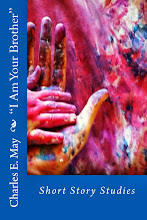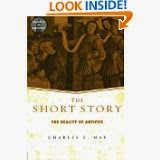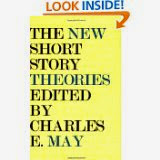I like the editing method of Best American Short Stories better than
the method of O. Henry Prize Stories. In the latter, the 20 stories depend solely
on the taste and judgment of Laura Furman, and I don't always understand her
judgment. In the BASS, Heidi Pitlor
picks 120 stories and then turns the batch over to an independent judge,
usually a fiction writer, to choose the final 20. Since the guest judge differs
each year, the reader gets some variety. I really liked the selection Elizabeth
Strout chose for the 2103 edition of BASS.
But although I enjoyed Jennifer Egan's A Visit from the Goon Squad, I was not
impressed with her selection in this year's BASS. I thought too many of the stories depended on
"ripped from the headlines" newsworthy content, simple concepts, or
technique tricks. Oh, well, next year is
another year, and regardless of how I felt abou this year's batch of stories, I
will look forward to the 2015 editions of Best
American Short Stories and O. Henry
Prize Stories. Here are my ho-hum
reactions to the 20 stories chosen by Jennifer Egan in this year's BASS.
"Charity" by Charles Baxter focuses
on a young gay man named Matty Quinn who has come back from working in Ethiopia
with infections that get him started taking painkillers. He lives in a basement
apartment in Minneapolis, but his boyfriend lives in Seattle. When his
painkillers run out, he mugs and robs a man to buy more, for which he feels
guilt. Part I of the story ends with his disappearance. The second part of the
story is told in first person by the Seattle boyfriend, who has just
told/written the first part of the story. He comes to Minneapolis and finds
homeless Matty living on the riverbank. After cleaning him up, Harry, the
boyfriend, beats up Matty's drug dealer and takes Matty back to Seattle and sets him up in an apartment. a simple
plot-based story that depends on "ripped from the headlines" prescription
drug abuse, African poverty, and homosexuality.
Anne Beattie,
"The Indian Uprisin." The most famous story with this title is by
Donald Barthelme. The only indication
that Beattie may have had it in mind is the opening disclaimer by one of the
characters in her story: "There's no copyright on titles. It wouldn't be a
good idea, probably, to call something Death
of a Salesman, but you could do it." The story is largely made up of
witty dialogue with literary allusions between the female narrator and a
seventy-year diabetic man who was once
her creative writing professor. While they are eating in a Mexican restaurant,
she sees blood on her old professor's foot and faints. When his receptionist, a
postoperative transgender, comes to take him to the hospital, he takes a
Mexican hat off the wall and puts it on, prompting someone to say, "There
might be an Indian uprising if we stop him.". The story ends with the
narrator telling us that the professor refused dialysis and died. Heeding her
professor's last bit of advice to find something to write about after he is
dead, the narrator says, even if I don't believe there's a poem in anything
anymore, maybe I'll write a story." And it is this story--not a great
story, but Anne Beattie-clever as usual.
I don't see any thematic connection between the story and the Barthelme
story. Perhaps Beattie had a personal connection in mind.
The voice we hear in Peter Cameron's
"After the Flood" is that of an elderly woman who "writes"
the story in a rambling, casual manner, with numerous asides. The story begins
with the woman's minister, Reverend Judy, coming to ask the narrator and her
husband if they will temporarily take in the Djukanovics, a family whose house and belongings have been
destroyed by a flood. Something has happened in the past to the narrator's
daughter, Alice, but she does not talk/write about that even. In a final conversation between the
narrator and the minister, we get hints that the narrator's daughter and her
own daughter Laila have been killed by the son-in-law because of financial
losses. The story ends with the narrator and her husband deciding not to go to
church any more. For a famous version of a similar "Displaced Person"
story that deals more complexly with loss, charity, and faith, see Flannery
O'Connor's story of that name. Cameron's story perhaps depends too much on a
"ripped from the headlines" murder and a too simple treatment of loss
of faith.
T.C. Boyle, "The Night of the
Satellite." This couple-conflict story focuses on two English graduate
students. On the way to a friend's farmhouse, they encounter another couple having
what the central male character calls "a lover's quarrel." The central
female character wants to help the young woman in the quarrel; the man does
not. This leads to clashes between the two, which is cranked up even more in
the evening when they go to bar and run
into the couple again. While they are quarreling out in a dark field later that
night, a small piece of mesh falls from the sky and hits the man on the
shoulder. He finds out online that a NASA satellite had fallen out of orbit,
scattering some debris; but his girlfriend thinks it is just from a tractor or
a lawnmower and throws it away. The first-person narrator drives away from the
farmhouse and sees the quarreling couple once again, still fighting. He thinks
that they can go on "careering around the world on any orbit they wanted
just as long as it never intersected mine again." He calls his girlfriend,
but she is still angry with him, so he hangs up, thinking that he wanted to say
was that he would be back and that she should look up in the sky "where
the stars burn and the space junk roams, because you never can tell what's
going to come down next." This is a
simple story based on a single metaphor of accidental stuff out of nowhere that
sometimes exposes character weaknesses and incompatibilities—right out of 1001 Nights.
Nicole Cullen,
"Long Tom Lookout" begins with the central character, Lauren, being
given responsibility for caring for her husband's 5-year-old son Jonah after
the child's mother is sent to jail for
drug possession and the father is on an oil spill skimming vessel on the Gulf
of Mexico. Insisting that she has no intention of being the boy's mother, she
drives to Idaho and takes a job with the Forest Service as a fire Lookout. You know that being stuck on a lookout tower with
the boy in the forest, there will be some sort of crisis and Lauren will feel a
commitment to the child. Sure enough, that's what happens.
Craig Davidson,
"Medium Tough." The gimmick in this first-person pov story by a
doctor is the heavy dependence on technical language of ailments, procedures,
medical devices, and the good doctor's flippant use of the tools of his trade.
A good dictionary would be helpful here, but is it worth it? One character says
to the narrator, "I love it when you talk shop." You will have to love the shop talk also to
get through this story. But then the story would not exist without it.
Joshua Ferris,
"The Breeze"—This is a "What do you want to do
tonight?"/"I dunno. What do you want to do" story. This "much ado about nothing" story
is held together quasi-poetically and supposedly meaningfully by the metaphor
of the "breeze" of the title.
The woman is enraptured by the breeze and it isn't in him to feel such
things. And, so it goes, or doesn't go, as they continue to query, "What
do you want to do?"/ "I dunno. What do you want to do?" A New Yorker story in the old bad way.
Nell
Freudenberger, "Hover"—An easy, trivial, single-read story about a
mother who, against her will, hovers slightly above the ground. It only happens
when she is doing "mom stuff," and so this is what it signifies—doing
mom stuff.
David Gates,
"A Hand Reached Down to Guide Me"—I have to admit that I found this
story about an English professor who teaches the Victorian novel and his
friendship with a father-figure mandolin-picker of bluegrass music who is dying
of cancer hard to resist. But then I am
an English professor from Eastern Kentucky who loves bluegrass music and wrote
his dissertation on Thomas Hardy. What's your excuse?
Lauren Groff,
"At the Round Earth's Imagined Corners"—The story begins in good old
David Copperfield novelistic fashion—"Jude was born in a cracker-style
house at the edge of a swamp that boiled with unnamed species of
reptiles." Now, all Groff has to do is invent what happened to this child
whose father is a crazy snake-raiser and whose mother runs away. If I were to
summarize the story, you would think I was summing up a novel that ends with a
man who escapes the "hungry darkness."
Ruth Prawer
Jhabvala, "The Judge's Will"—O.K. here's the situation: A Delhi judge
has a heart attack, his second, and decides he must tell his wife about the
provisions in his will for the woman he has been keeping for 25 years. When she
finds out he wants her to meet the woman, she takes it rather well, for she
does not love him, and is only concerned with her son, who is more like a
brother to her than a son. When the woman begins visiting the house on a
regular basis, the relationships between the four all become like what the son
says is an "old-fashioned French farce." A plot-based 1001 Nights
type story that is fun, but not fulfilling.
O. A. Lindsey,
"Evie M."—This is a first-person pov story in the form of notes taken
by a veteran of one of the recent wars in the Middle East. Although the narrator imagines ejaculating
and a colleague makes a reference to sucking the narrator's dick, it seems
relatively clear that the narrator is a female with a female lover and is suffering
some form of post-traumatic stress, the
story ending with a suicide attempt.
More "ripped from the headlines."
Will Mackin,
"Kattekoppen"—An American soldier in Afghanistan regularly gets a childhood
favorite Dutch licorice from his mother, for she does not know that he no
longer likes the candy. In fact no one likes the candy, so it stays on a shelf,
becoming valued only when the narrator uses it to mask the smell of a
decomposing ambushed comrade. You gotta like war stories to like this one.
Brendan Mathews,
"This is Not a Love Song." In his comments on this story, Mathews
says it was busted until he discovered the point of view he needed to make it
work. The pov he uses is a series of photographs focusing on a female rock singer
with whom the narrator/photographer went to high school and with whom she is so
obsessed that friends think they are lesbians. The story depends largely on the
photo pov.
Molly McNett,
"La Pulchra Nota"—The center of this story of a14th century music teacher
is his understanding of la pulchra nota—the
moment that music comes closest to perfection: "La pulchra nota is the moment of beauty absolute, but what follows—a
pause, however small—is the realization of its passing. Perhaps no perfection is without this silent
realization." This is Isak Dinesen type fable of disfigurement, loss,
denial, religious obsession, sin, and punishment.
Benjamin
Nugent, "God"—The first sentence sums up the story: "He called
her God because she wrote a poem about how Caleb Newton ejaculated prematurely
the night she slept with him, and because she shared the poem with her friends."
If you were in a college fraternity, you may appreciate this story. I was not.
Joyce Carol
Oates, "Mastiff." I read this story when it first appeared in The New Yorker. Every time I read a new Joyce Carol Oates
story, I try to like her, but God help me, I cannot. She makes it look so easy. And in most cases that's what the story is—easy.
Joyce Carol Oates can make a story out of everything. And it seems she does. For Oates, anything—such as a man being
attacked by a huge dog—can mean something—that is, if, like Oates, you know how
to make a story.
Stephen
O'Connor—"Next to Nothing"—Two sisters, sociologists, are caught in
Hurricane Irene. I made the mistake of reading O'Connor's "contributor's
notes" on this story before reading the story—a mistake because I liked
the notes better than I did the story. O'Connor suggests the story is about the
complex paradox that even though he is an atheist, he must live by faith—"not
in spiritual terms, but in the sense that in order to be a happy and decent
human being" he must cherish beliefs that can never be verified. Intriguing
idea that catches my imagination. The story not so much.
Karen Russell,
"Madame Bovary's Greyhound"—I have posted blogs on Russell's two
collections of stories St. Lucy's Home
for Girls Raised by Wolves and Vampires
in the Lemon Groves. You can do a
search over to the right of this and see what you think. The basic problem I have with Russell's new
story is the same I had with her previous ones—they are concept stories—fun to
read for their imaginative inventions, but lacking in depth. In this one, it
helps if you have read Flaubert
Laura van den
Berg, "Antarctica." I liked
this story of a woman who comes to Antarctica to find out about the death of
her brother, not because it was the longest, but because it was the most
ambitious in its exploration of the mystery of being human. No tricks, no self-conscious
gimmicks here, just an honest exploration of why people do the inexplicable
things they do.



